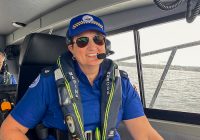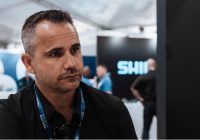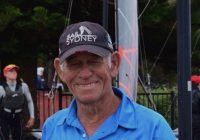Michael Blackburn is the Australian Sailing Team Technical Director, three-time Olympic gold medal winning coach and an Olympic bronze medalist himself in the ILCA 7 (formally Laser) class from the Sydney 2000 Olympics.
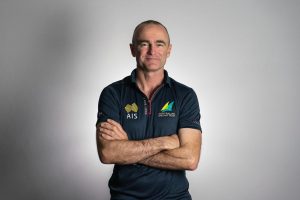
Michael’s story began when he was just eight years old, drawn into sailing by his older brother and supported by their parents. “It was like, ‘want to try this?’ and I said ok… not knowing much about it,” he said.
But it didn’t take long before he was captivated by sailing and the independence it offered. “I was absorbed into the thrill of it, including the sensation of being able to drive this ‘vehicle’ around as a kid, pushed only by the wind.”
Seeing Australia excel on the world stage at the 1983 America’s Cup was a pivotal moment that inspired Michael to chase excellence. His passion continued to grow, shaped by the ever-changing nature of the sport. “Every day is different. We never see the same conditions twice,” he shared. “That unpredictability kept things exciting and laid the foundation for a career that would stretch far beyond the boat.”
Michael’s rise through the ranks followed a well-worn but demanding patj. Michael broke this down into three key steps.
“The first one is called ‘train to train’ and it’s about clocking up the hours and experience in the sport to learn and perform the basic skills in order to ‘train to compete’. This second step is about being more formal with how you prepare yourself so that your performances become more accurate and you make your body fitter and more mentally resilient. The third step is ‘train to win’. This is about relying on thousands of hours of purposeful training to put together performances that are better than other athletes.”
He became a Club Champion as a teenager, a National Champion in his early twenties, won Olympic bronze medal at 30 and finally claimed the Laser World Championship title at 36.
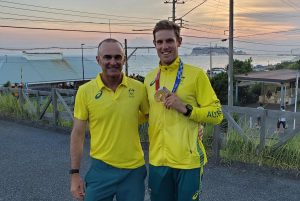
Michael reflected, “Throughout my progression, my belief in what I could achieve grew as well. Gradually, reducing the error rate in my racing was the key.”
Even while competing, Michael had one eye on the technical side of the sport. With a background in Sport Science, he immersed himself in learning how to train better, recover faster and make smarter decisions under pressure. That academic grounding paid off when he transitioned from athlete to coach after competing in three Olympic Games.
Early in his coaching career, he focused on the technical side – areas like equipment, race strategy and data analysis. Over time, he developed the more human side of coaching, learning how to guide, motivate and communicate with athletes effectively. That balance helped create a legacy in the ILCA class, where a tight-knit group of sailors pushed one another to Olympic success. During his three Olympic campaigns as coach, the squad produced three Olympic champions. That legacy continued at Paris 2024, with a fourth gold medal, a testament to the high-performance culture Michael helped create.
“I didn’t actually want to be a coach at first,” explained Michael. “I just loved the sport and competing. The deep understanding of the sport that I developed during 15 years as an athlete meant I was well qualified to transition into coaching once my competitive career had concluded. I then coached for 10 years, gradually developing more leadership skills and experience along the way, making me well suited for the challenges of the current role.”
Following the Tokyo Olympics, Michael stepped into the role of Technical Director of the Australian Sailing Team, working both from the National Training Centre in Sydney and abroad at international competitions. The role focuses on working with coaches and staff on training and competition plans for athletes as well as logistics and long term planning. He still gets to spend time on the water with the coaches and athletes in both training and racing environments to help contribute to performance.
Despite the rewards, the job isn’t without its challenges, especially the toll of being away from more than 100 days each year. Michael shared,“I fortunately have a wife that appreciates the commitment needed for the job and is supportive. However, this does need careful planning and compromises. We’re also lucky to have help from my wife’s parents in looking after our kids.”
For those considering a career in sport, particularly in coaching, Michael believes that a strong passion and hunger to keep learning are essential. “It can be a very ‘giving’ profession at times and requires consistent effort over many years to keep developing yourself and learn in a practical sense about what works and what doesn’t as far as athlete development goes.”
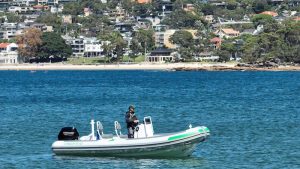
Michael has played a pivotal role in the Australian Sailing Team’s success across eight Olympic Games and continues to shape its future. His seamless transition from athlete to coach, to Technical Director reflects his commitment to continuous development and a champion mindset.






